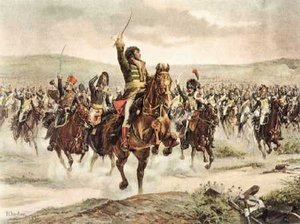
France is ashamed of his past. And particularly Napoleon. Last year, she had not seen fit to celebrate the bicentenary of Austerlitz. This year it's Jena that went by the wayside. This battle is yet another great feat of arms of the Emperor. Stories and Polemics is therefore above because knowledge of our past should not be overshadowed by the acts of repentance.
During summer 1806, Europe is at peace. France-England rivalry has diminished, Austerlitz and Trafalgar proméninence having established the two kingdoms in their respective fields. The sea to Britain, the continent for France. The death of William Pitt, a fierce opponent of Napoleon has also improved the climate. Finally, Britain is not the best economically.
But all is not necessarily well in the brave new world. Napoleon reorganized the Holy Roman Empire into a federation of state which are necessarily favorable: the Confederation of the Rhine. And it worries Frederick III of Prussia. The big Army is in Bavaria and Moravia to monitor the Austrian and Russian units of the 3rd coalition.
tone up between Prussia and France. Provocation, the officers of the Prussian army like to sharpen their swords on the steps of the Embassy of France in Berlin. Frederick III lance who will listen: "No need for swords, clubs will suffice for these French dogs."
To top it off, he sealed an alliance with Alexander I and swear not to separate until the victory over France will not be granted. Prussia, Russia, Sweden and Saxony will then form the 4th coalition. They will be joined by England on September 14 with the death of Prime Minister Fox, more favorable to Napoleon.
On 4 October, the Emperor receives an ultimatum demanding the withdrawal of French troops right banks of the Rhine. Immediately Great army of 180,000 strong men overwhelmed the Confederacy. An initial confrontation October 10 sees the death of the nephew of Frederick II, but victory is not final. The body is pushed to Prussian Saalfeld, but the coalition forces withdrew northwards, leaving a strong rearguard at Jena.
Marshal Lannes arrived with part of the Grand Army: 55 000 10 000 men more riders. The whole is supported by 173 cannons. Napoleon ordered all. Opposite, the Prussians were about 50 000 and have 120 guns.
Jena is located in a valley. The Emperor himself will direct the work that will broaden the narrow path in order to pass the artillery. He thus manages to overlook the Prussian army concentrated before him.
At 6 o'clock in the morning, he gave the order to attack. Surprised, the Prussians believe in a massive attack. But right out of their 30,000 French fog. Immediately, Lannes upsets the general reserve Tauertzien while progressing in the right Soult and Augereau on the left. The battle is lost to Prussia and Napoleon ordered the prosecution fugitives. Murat's cavalry managed to capture the enemy artillery.
There are 12 000 deaths among the Prussians and the French in 6000. In addition 14 000 prisoners.
The same day the French victory Auerstadt (Davout with 27,000 men defeated the 60,000 Prussian soldiers from Brunswick) amplifies the magnitude of the triumph. Prussia lost 45,000 men and his artillery.
27 October Napoleon entered Berlin. On the 28th Murat capture the Prince of Hohenlohe and his army. November 30, Prussia was forced to peace: She lost half its territory, 5 million people, some of its strongholds (Magdeburg, Erfurt, Stettin, Graudeuz, Danzig) and must pay an indemnity of 120 million francs at the time.
If it is the big loser in history, this victory will be one of the last truly brilliant of Napoleon.
Soon will come the war in Spain, the failures in Russia, bled for years 1810-1813
... But that's not the worry. How is it that France has so ashamed of her past, she now refuses to celebrate. Except for repentance, our country overshadow everything that has made it great. It is a crime against our memory. A crime against our history.
0 comments:
Post a Comment